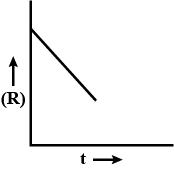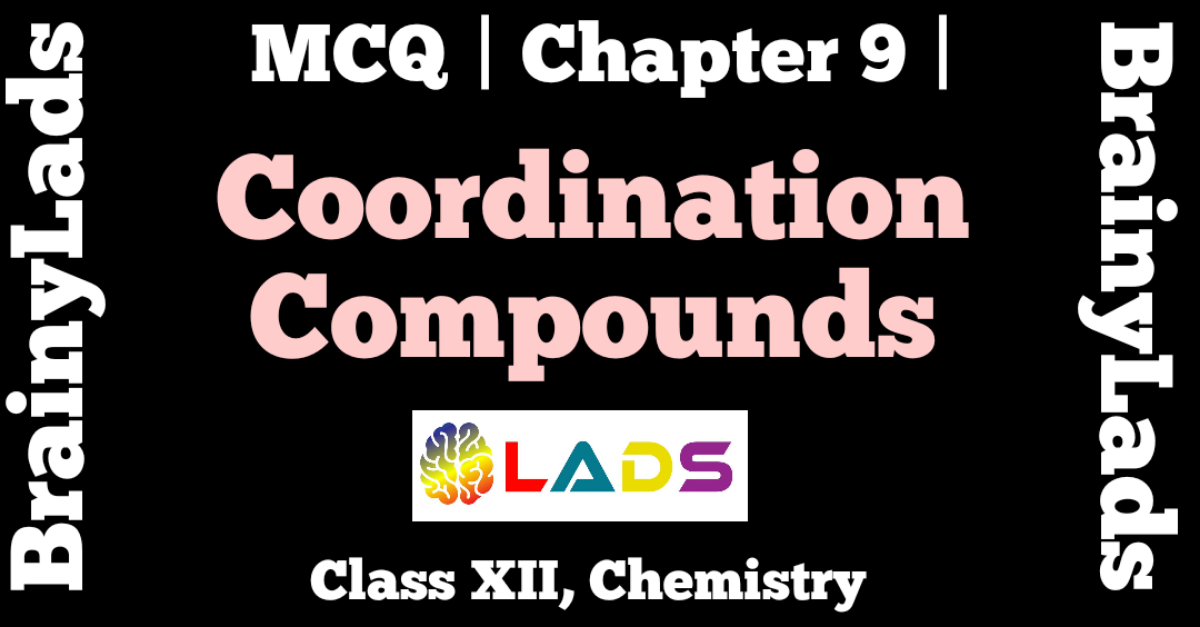MCQ of Chemical Kinetics | Chapter 4 | Chemistry | Class X12 | CBSE |
MCQ of Chemical Kinetics | Multiple Choice Questions of Chemical Kinetics
MCQ of Chemical Kinetics
Question 1: How does concentration of reaction change with time for a chemical reaction ?
- Increases
- Remain Unchanged
- Decreases
- Becomes twice
Answer: C (Decreases)
Question 2: The rate constant of a reaction is 3 x 10 2 min -1 . What is the order of the reaction?
- First
- Second
- Third
- Zero
Answer: A (First)
Question 3: For a reaction R→P, half life (t 1/2) is observed to be independent of the initial concentration of reactants. What is the order of reaction?
- Zero
- First
- Second
- None of these
Answer: B (First)
Question 4: A reaction in which reactants are converted into products follows second order kinetics. If concentration of R is increases by four times, what will be the increase in rate of formation of P?
- 9 times
- 4 times
- 16 times
- 8 times
Answer: C (16 times)
Question 5: The order of reaction is decided by
- Temperature
- Mechanism of reaction as well as relative concentration of reactants
- Molecularity
- Pressure
Answer: B (Mechanism of reaction as well as relative concentration of reactants)
Question 6: Which of the following for order of reaction is not correct?
- Order can be determined experimentally
- Order of reaction is equal to the sum of powers of concentration term in rate law expression.
- Order cannot be fractional
- Order is not affected by stoichiometric coefficient of the reactants.
Answer: C (Order cannot be fractional)
Question 7: A reaction is of second order with respect to a reactant. How is the rate of reaction affected, if the concentration of reaction is reduced to half?
- 4 times
- 1/4 times
- 16 times
- Remain unchanged
Answer: B (1/4 times)
Question 8: For a chemical reaction , R→P, the variation in concentration of R with time pot is given as below, predict the order of reaction?
- Zero order
- First order
- Second order
- Insufficient information
Answer: A (zero order)
Question 9: For a reaction A+ B → P, the rate law is given by , r = k[A]1/2 [B]2 . What is the order of this reaction?
- 1/2
- 2
- 5/2
- 3/2
Answer: C (5/2)
Question 9: The overall rate of reaction is governed by
- The rate of fastest intermediate step
- The sum of the rates of all intermediate steps
- The average of the rates of all the intermediate steps
- The rate of slowest intermediate step
Answer: D (The rate of slowest intermediate step)
Related
Question 10: Under what conditions a bimolecular reaction may be of first order?
- When both reactants have same concentration.
- When one of the reacting species is in large excess.
- When the reaction is at equilibrium.
- When the activation energy of reaction is less.
Answer: B (When one of the reacting species is in large excess. )
Question 11: In pseudo unimolecular reactions,
- Both the reactants are present in low concentration
- Both the reactants are present in same concentration
- One of the reactant is present in excess
- One of the reactant is non reactive
Answer: C (one of the reactant is present in excess)
Question 12: When a catalyst is used in an equilibrium process
- It increases the rate of forward reaction
- It decreases the rate of backward direction
- It decreases activation energy of both forward and backward direction
- It fastens the attainment of equilibrium by lowering activation energy.
Answer: D (It fastens the attainment of equilibrium by lowering activation energy.)
Question 13: Half life period of a first order reaction is 10 min. What percentage of the reaction will be completed in 100 min?
- 25%
- 50%
- 99.9%
- 75%
Answer: C (99.9%)
Question 14: Threshold energy is equal to
- Activation energy
- Activation energy – energy of molecules
- Activation energy + energy of molecules
- None of these
Answer: C (Activation energy + energy of molecules)
Question 15: The unit of rate and rate constant are same for a
- Zero order reaction
- First order reaction
- Second order reaction
- Third order reaction
Answer: A (Zero order reaction)
Question 16: The number of molecules of the reactants taking place in a single step of the reaction is indicative of
- Order of reaction
- Molecularity of reaction
- Fast step of the mechanism of reaction
- Half life of the reaction
Answer: B (molecularity of reaction)
Question 17: What will be the rate equation for the reaction 2 X + Y → Z, if the order of the reaction is zero?
- Rate = k[X][Y]
- Rate = k
- Rate = k[X]0[Y]
- Rate =k[X][Y]0
Answer: B (Rate = k)
Question 18: For a reaction X → Y, the rate of reaction becomes twenty seven times when the concentration of X is increases three times. What is order of the reaction?
- 2
- 1
- 3
- 0
Answer: C (3)
Question 19: The rate constant of a reaction depends upon
- Temperature of the reaction
- Extent of the reaction
- Initial concentration of the reactants
- The time of completion of reaction
Answer: A (Temperature of the reaction)
Question 20: The rate of a chemical reaction doubles for every 10ºC rise of temperature. If the temperature is raised by 50ºC , the rate of the reaction increases by about:
- 24 times
- 32 times
- 64 times
- 10 times
Answer: B (32 times )
Question 21: In the presence of a catalyst, the heat evolved or absorbed during the reaction….
- Increases
- Decreases
- Remains unchanged
- May increase or decrease
Answer: C (Remains unchanged)
Question 22: The increase in concentration of the reactants lead to change in
- ΔH
- Collision frequency
- Activation energy
- Equilibrium constant
Answer: B (Collision frequency)
Question 23: For an endothermic reaction, ΔH represents the enthalpy of reaction. The minimum amount of activation energy will be
- Less than zero
- Equal to ΔH
- Less than ΔH
- More than ΔH
Answer: D (More than ΔH)
Question 24: The chemical reaction in which reactant require high amount of activation energy are generally
- Slow
- Fast
- Instantaneous
- None of these
Answer: A (Slow)
Question 25: Collision theory is applicable to
- First order reactions
- Zero order reactions
- Bimolecular reactions
- Intramolecular reactions
Answer: C (Bimolecular reactions)
Do share this post if you liked it. For more updates keep logging on BrainyLads



